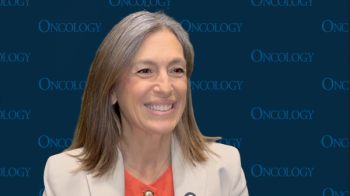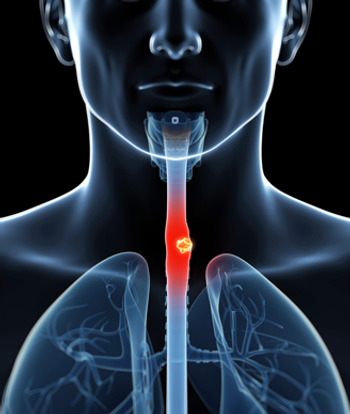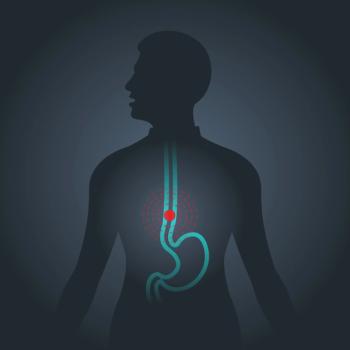
Oncology NEWS International
- Oncology NEWS International Vol 17 No 4
- Volume 17
- Issue 4
Neoadjuvant chemotherapy beneficial in esophageal cancer pts
The use of neoadjuvant chemotherapy in resectable esophageal cancer was bolstered by the results of two trials presented at the 2008 Gastrointestinal Cancers Symposium.
ORLANDO-The use of neoadjuvant chemotherapy in resectable esophageal cancer was bolstered by the results of two trials presented at the 2008 Gastrointestinal Cancers Symposium.
Long-term follow-up of the MRC OE02 trial in the United Kingdom confirms that preoperative chemotherapy improves disease-free survival, compared with surgery alone, and should be considered a standard of care, said William H. Allum, MD, consultant surgeon, GI Surgery Unit, Royal Marsden Hospital, London (abstract 9).
In the study, 802 patients were randomized to surgery alone or two cycles of combination cisplatin 80 mg/m2 on day 1 and 5-FU 1 g/m2/d on days 1-4 before surgery. The initial results, reported in Lancet (359:1727-1733, 2002), showed significant advantages for disease-free and overall survival at 3 years. Two-year survival was 43% with neoadjuvant chemotherapy vs 34% with surgery alone.
This update, with median follow-up of 6 years, showed that the results were maintained long-term. Recurrences were reduced by 18% (P = .003) and mortality was reduced by 16% (P = .03). Overall survival at 5 years was 23% with neoadjuvant chemotherapy vs 17% with surgery alone, Dr. Allum reported.
As in the initial analysis, the difference in survival in favor of neoadjuvant chemotherapy remained consistent in both patients with adenocarcinoma (5-year survival 24% vs 17%) and squamous cell carcinoma (23% vs 18%). The treatment effect was maintained across stratification variables of age, sex, and tumor site.
An evaluation of all patients by resection status showed a substantial benefit for patients in whom a macroscopically complete resection was possible and surgical margins were clear (R0), compared with patients who had positive margins (R1) or those whose resection was incomplete (R2). Three-year survival rates in these subsets were 42%, 18%, and 9%, respectively, and median survival was 2.1, 1.1, and 0.8 years, respectively.
Dr. Allum noted that comparing survival between treatment arms by resection status would be inappropriate, due to the downstaging effect of preoperative chemotherapy.
An ongoing UK trial (OE05) is addressing the question of the most appropriate chemotherapy combination for these patients.
Japanese study
Japanese investigators concluded from study JCOG 9907 that preoperative chemotherapy with cisplatin and 5-FU followed by surgery is superior to postoperative adjuvant chemotherapy with the same regimen (abstract 10) and can be regarded as a standard of care. Their previous trial, JCOG 9204, showed that adjuvant chemotherapy improved survival over surgery alone in esophageal squamous cell carcinoma.
JCOG 9907 randomized 330 patients with stage II-III squamous cell carcinoma of the thoracic esophagus to two cycles of chemotherapy with cisplatin (80 mg/m2 on day 1) plus 5-FU (800 mg/m2/d on days 1-5) followed by surgery or to surgery followed by the same regimen. Median follow-up was 23 months.
At a planned interim analysis in March 2007, median progression-free survival was 3 years for the preoperative chemotherapy arm and 2 years for the postoperative chemotherapy arm, representing a 24% reduction in risk
(P = .044), which did not meet stopping criteria, reported Nobutoshi Ando, MD, of the Tokyo Dental College, Ichikawa General Hospital. However, the reseachers observed an “unexpectedly large difference” in 5-year overall survival, a secondary endpoint, Dr. Ando said: 60% and 38%, respectively, for a 36% reduction in risk with preoperative treatment (P = .013).
There was no significant increase in adverse events with the preoperative approach, and no significant interaction between nodal status and treatment effect.
Based on these findings, the Data and Safety Monitoring Committee recommended early termination of the study and publication of the results.
Preoperative chemotherapy also induced downstaging and the ability to achieve R0 margin status. The survival benefit occurred primarily in patients with stage II disease, he added.
VantagePoint Several standards of care for resectable esophageal ca
Susan G. Urba, MD - The trials from the UK and Japan reached a similar important conclusion: “There is a survival benefit for preoperative chemotherapy in esophageal cancer,” said Dr. Urba, of the University of Michigan Comprehensive Cancer Center.
The National Comprehensive Cancer Network was concerned that the survival benefit observed in MRC OE02 might not hold up, she said. After a median follow-up of 6 years, the survival benefit was indeed maintained.
Dr. Urba noted that the size of this trial-802 subjects-contributed to the strength of the data. One weakness, she said, is that the study lacked information about disease stage.
The study also showed the importance of resection status. “Survival in patients with R0 resection is two to three times longer than in patients with positive margins,” she said. Also, there was no difference in 5-year survival between adenocarcinoma and squamous cell carcinoma.
Concern about Japanese study
Dr. Urba expressed concern that in the Japanese study, a disproportionate number of patients per arm did not receive or complete their assigned treatments: 53% in the postoperative arm vs 12% in the preoperative arm. “Were the benefits for preoperative therapy due to better delivery of the drug?” she asked.
Interestingly, she said, postop chemotherapy in the original Japanese trial resulted in the same 5-year survival rate (61%) as preop chemotherapy in the second trial. “I personally favor preop delivery because you can get more chemotherapy into the patients before they become too debilitated,” Dr. Urba said.
NCCN guidelines
The NCCN guidelines do not currently recommend pre- or postoperative chemotherapy as the standard of care. “Their primary recommendation is for treatments that involve chemoradiation,” she said.
Dr. Urba concluded that there are “several standards of care, influenced by geographical location, patient status, and institutional bias.”
Preoperative chemotherapy is more often used in Europe and Asia; preoperative chemoradiation in the US. Postop chemoradiation is also a standard, especially for cancer of the GE junction not treated preoperatively. Definitive chemoradiation without surgery is also a standard of care, she added, particularly in institutions lacking a thoracic surgeon experienced in esophagectomies and for patients unfit for surgery.
Articles in this issue
almost 18 years ago
Proton therapy training offeredalmost 18 years ago
Editor of Blood reviews a very bloody moviealmost 18 years ago
Artists take note: Oncology on Canvas accepting entriesalmost 18 years ago
PET affects treatment in over one-third of cancer casesalmost 18 years ago
Expanded use of Axxent approvedalmost 18 years ago
Gardasil supplemental application gets priority review designationalmost 18 years ago
Optical tomo/US monitors adjuvant chemo responsealmost 18 years ago
GIST patients resistant to imatinib/sunitinib respond to sorafenibalmost 18 years ago
Sunitinib plus a taxane active in advanced breast canceralmost 18 years ago
Stanford V yields excellent outcomes in bulky, advanced HLNewsletter
Stay up to date on recent advances in the multidisciplinary approach to cancer.



































